As a senior executive with more than 30 years’ experience in the logistics and shipping industry, Mohamed Al Mazeedi is not your typical recent graduate. But last year, the 53-year-old Kuwaiti graduated with a doctorate in business administration from Walden University, Minnesota, in the US.
The vice president of United Arab Shipping Company’s Middle East trade management unit reveals why he returned to studying so late in his career, how he managed his time between work, family and studies, and why he hopes to stay busy.
What motivated you to go back to studying? You were already in a very senior position, so why do it?
I always wanted to have a doctoral degree. My first attempt to get the doctoral degree was in 1990. Unfortunately this was halted by the invasion, when Iraq invaded Kuwait. Everything was stalled for seven months or eight months. During that time I was in Kuwait. After that, with all of the changes, the destruction and the impact of the invasion I decided to put it on hold for a while. In 2009 I reactivated the process through Walden. Four years later in December last year I graduated, so finally I became a doctor.
How did you juggle your work, family life and studies?
I was responsible for a family and I have six kids and a couple of grandchildren. Also the job was very, very demanding, especially during that era from 2009 to 2012, those three years in particular, because the industry was not making money. All shipping companies were losing money, so there was an extra pressure to make sure that at least the losses are minimised, if not turned into profit. The work pressures were really tremendous. What helped me and gave me a little bit more flexibility was the fact that the programme was online. The way I handled it was by developing a detailed plan six months in advance. I updated it monthly and most critically I followed it religiously, as they say. Family time, if I remember, was every Friday for three hours and no matter what happened, those three hours were given to the family. Otherwise I would probably be divorced by now.
Did you find that anything suffered, despite your best efforts?
In reality there were two things that probably can be defined as areas that suffered the most. Number one was family. They were given three hours a week versus normally probably much more than that, so without the family support, understanding and basically acceptance it would have been almost impossible to finish the programme. And then my own pleasure time was almost non-existent. Putting these together and looking back at things now, I look at it as part of the challenge. It taught me when you plan things, and stick to it, you can create miracles.
Did you find it difficult adjusting to normal life after you graduated? Following a schedule must have become second nature to you.
The good part is that I graduated in December, about Christmas time and New Year, so it was a good break to take the family out on a long and well-deserved holiday. When I came back, I almost immediately started writing an article again through Walden and, with the support of my chairman at Walden, started other activities that kept me pretty busy. Going through online education, continued education, keeping a family and also working introduces a rhythm within a person which tends to work towards continued achievement. Part of the adjustment was to come up with new targets and new goals to reach. But that busyness helped me to make a smooth adjustment.
Now you want to teach?
Actually what I’m thinking of is developing an institute that is designed to combine the [practical] side with the theory side. I have started developing courses to be taught in this institute. There are three areas I am looking at. One is logistics, which is my speciality and the other one is oil, geology and drilling, which is a speciality of the region. The other one is leadership and teamwork. This I am doing in association with partners from the US. So far the plan is not an official MBA or degree course, it is certified training for people to go back and use at work but supported with academic theory and research.
Will you work at the same time? Or is it your ambition to do this full-time?
I would still work.
You want to stay busy then?
Absolutely.
business@thenational.ae
Follow The National's Business section on Twitter






